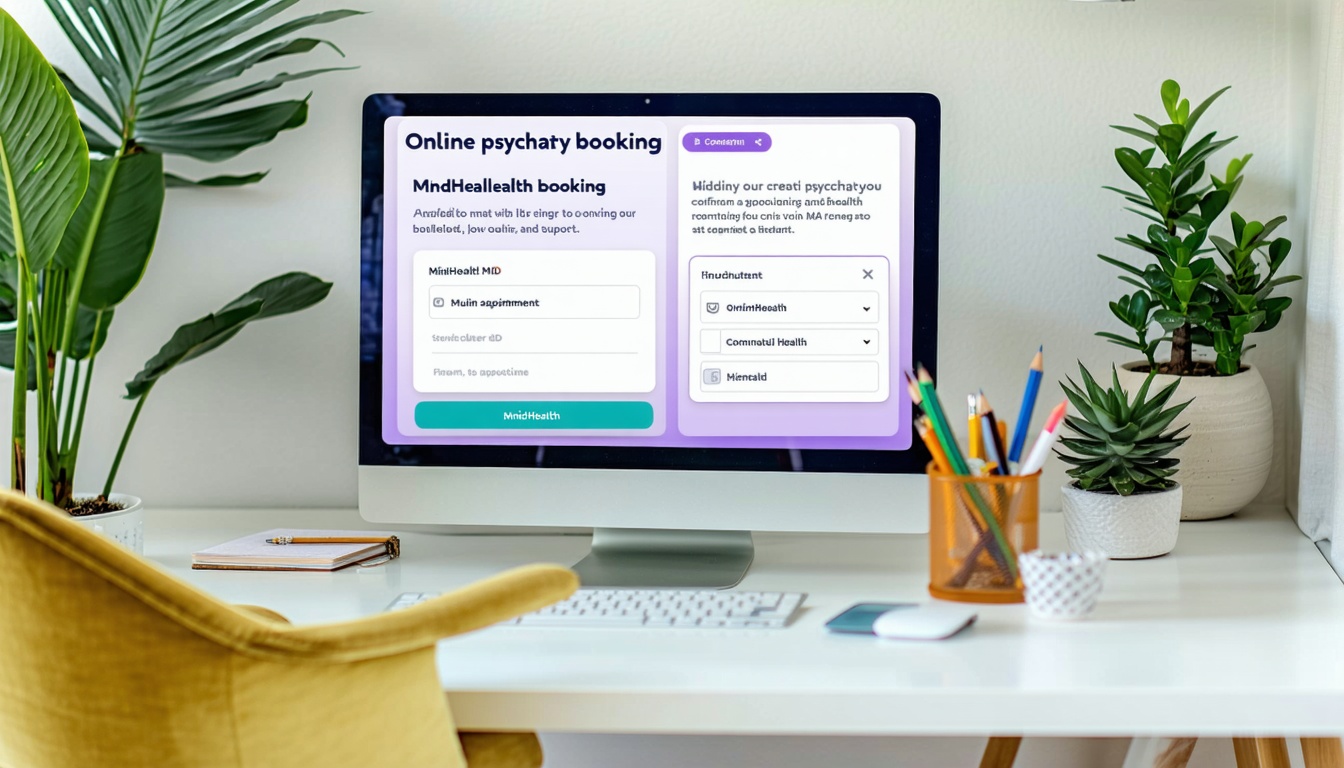Reflect on depression basics
If you or a loved one is considering a depression psychiatry appointment right now, you’re very much not alone. Depression affects millions of people each year, and research suggests that approximately one in six individuals will experience a major depressive episode at some point in their lifetime [1]. Despite its prevalence, depression still carries a good deal of stigma. Many people assume it is simply “feeling sad,” but the reality can be far more nuanced. Symptoms might show up as fatigue, lost interest in activities, negative thinking patterns, or even disrupted sleep.
You may wonder, “Why do I feel this way?” or “Is there hope for treating such persistent sadness?” The good news is that effective treatments do exist. Psychotherapy and medication are proven to help the vast majority of people coping with depression, and in more challenging cases, other methods like transcranial magnetic stimulation (TMS) can bring relief. By understanding why a formal psychiatric appointment is so valuable, you can set yourself or your loved one on the path to proper care.
Depression as a complex condition
Depression isn’t just a single uniform experience. It differs from person to person, with some individuals showing classic sadness and others expressing anger, irritability, or even withdrawal. In fact, men often mask their symptoms as frustration or denial, which can make depression harder to recognize [2]. Regardless of how it presents, depression significantly impacts daily life. It can reduce your motivation, disrupt relationships, and potentially lead to harmful coping mechanisms like substance misuse.
Because depression can have so many faces, it’s essential to place trust in a comprehensive approach. You might need a physical exam from your primary care provider or mental health screenings that assess mood, behavior, and lifestyle. When you land at a reputable clinic—either in person or through telehealth—you’ll have a thorough evaluation that looks at your full medical and personal history to find the best treatment path.
Managing depressive symptoms proactively
You don’t have to wait until you’re in crisis to seek help. If you’re noticing persistent symptoms—lack of energy, difficulty getting out of bed, loss of interest in hobbies—a depression psychiatry appointment might offer the clarity and resources you need. Early intervention can make a significant difference, from adjusting lifestyle factors to exploring supportive techniques like:
- Physical activity, which can reduce symptoms and boost energy [3]
- Balanced eating habits, high in whole foods and healthy fats
- Social connections or support groups to reduce a sense of isolation
No matter the approach, the key is consistent monitoring, whether you work with a therapist, psychiatrist, or both. A psychiatrist can prescribe medication if necessary, ensuring dosage adjustments over time. But medication alone won’t solve everything. Most people get the best results from a blend of therapy, consistent follow-up, and day-to-day self-care.
Explore telehealth psychiatry benefits
Over the last few years, telehealth services for mental health needs have blossomed. One major reason is convenience. If you’re dealing with depression, setting aside a chunk of time to attend in-person visits might feel overwhelming. Telehealth psychiatry latches onto technology—like secure video conferencing—so you can talk with a professional from the comfort of your home.
Greater convenience, less stress
Scheduling a telehealth session removes barriers such as travel time, unexpected traffic, or having to sit in a crowded waiting room when you’re already feeling low. When you’re in a depressive state, everyday tasks can feel extra daunting. You can sidestep these stressors and still receive high-quality care once you log on for your virtual appointment.
In fact, some people find they’re more comfortable opening up when they’re in familiar surroundings. Virtual sessions can help you cut down on the emotional strain of traveling to a clinic, making it easier to share your concerns openly. If you prefer to keep your immediate circle small, you can join from a quiet corner of your home or another confidential space.
Quality care at your doorstep
Access to a qualified professional is crucial for effective mental health support, and telepsychiatry bridges geographical gaps. If you’re in a remote area or have limited local mental health resources, a video session can connect you with top-notch psychiatrists who might otherwise be hours away. Even if you’re in a busy urban setting, telehealth can offer flexible scheduling that fits your routine more seamlessly.
You won’t sacrifice quality by choosing telehealth. Credentialed psychiatrists and nurse practitioners conduct initial assessments, propose treatment strategies, and follow up regularly. If you need prescription refills or medication adjustments, they’re easily managed through telehealth. Alternatively, if you do require in-person services at any point, such as certain specialized procedures, the telepsych team can guide you to the right local resources.
Recognize the power of MAT
Medication assisted treatment (MAT) is a critical tool if you or a loved one faces substance use issues alongside depression. Sometimes, depression and substance misuse go hand in hand. You might drink more or use substances to self-medicate the sadness and anxiety. Conversely, struggling with addiction can foster depressive feelings, especially when withdrawal or life consequences begin to mount.
Who benefits from MAT?
MAT usually combines medication—such as buprenorphine for opioid addiction or naltrexone for alcohol dependency—with counseling or behavioral therapies. This evidence-based approach reduces cravings, stabilizes mood, and lessens the psychological effects of withdrawal. According to multiple healthcare providers, MAT is often a game-changer for people who have tried other methods without lasting results.
If addiction is impacting your daily life, it can be intimidating to reach out for help. But imagine having the support of specialized mental health professionals, convenience in scheduling, and the knowledge that you won’t be judged. MAT is specifically tailored for those with co-occurring disorders, meaning you can address both your mental health and any substance-related concerns simultaneously. You might explore medication assisted treatment if you need a structured plan to handle both depression and addiction.
MindHealth MD’s approach
MindHealth MD prides itself on an integrated framework. Instead of tackling one problem at a time, they focus on the bigger picture—your overall well-being. When it comes to MAT, their telehealth programs simplify the process:
- Initial assessment: A thorough review of your medical history and current symptoms
- Personalized plan: You get medication recommendations that align with your situation, whether that’s for opioid addiction or alcohol dependency
- Ongoing support: Through consistent telehealth check-ins, you can access therapy sessions and medication refills without leaving your home
- Follow-up adjustments: Fine-tuning the course as needed, so you’re never stuck on a regimen that isn’t working
If this approach sounds like a good fit, you might consider booking a consultation through mat for opioid addiction or mat for alcohol dependency. These pages detail how MindHealth MD personalizes treatment, emphasizing a caring, non-judgmental environment.
Consider TMS as an option
When dealing with moderate to severe depression that resists traditional approaches, transcranial magnetic stimulation (TMS) can be a promising route to explore. TMS therapy involves using magnetic fields to stimulate specific areas of the brain linked to mood regulation. It’s often recommended for individuals whose symptoms don’t improve sufficiently with medication or talk therapy alone.
What is TMS therapy?
You’ll lie back in a specialized chair while a practitioner positions a coil against your head. Gentle pulses then target the prefrontal cortex, aiming to encourage more natural mood regulation. According to the National Institute of Mental Health, TMS can significantly reduce depressive symptoms and help you regain lost motivation [2].
TMS is noninvasive and typically doesn’t require anesthesia, so you can resume daily activities right after a session. It’s not a quick fix, though. Most treatment plans involve multiple sessions per week over several weeks. Because TMS navigates parts of the brain that regulate mood, the overall goal is to retrain neural pathways to achieve a healthier emotional state.
Why TMS might help you
Is TMS always the “magic bullet”? Of course not. Every individual’s depression is unique, and what works for one person may not be as effective for another. However, many patients who haven’t responded well to medication or psychotherapy alone report a notable lift in mood and energy levels after completing TMS sessions. Such improvements often allow them to resume therapy with renewed optimism or tolerate antidepressants more easily.
If you’re intrigued by TMS, you can schedule tms treatment or explore more about tms therapy for depression. These steps may be especially valuable if you’ve cycled through various prescriptions without lasting relief.
Why choose MindHealth MD?
So, what elevates MindHealth MD above other providers? In short, they’ve developed a seamless, patient-centered platform designed to meet you wherever you are in your journey. Whether you’re seeking a brief consultation for milder forms of depression or looking into advanced therapies like TMS, MindHealth MD offers an array of services.
Personalized approach from day one
Some clinics adopt a one-size-fits-all strategy, but MindHealth MD breaks that mold by customizing care. The staff evaluates factors like your medical history, family background, personal preferences, and even your lifestyle habits. This ongoing evaluation helps them tailor therapy options—be it psychotherapy, a particular medication, or specialized interventions like TMS or MAT. If you want to pick a friendly time slot or ensure you’re covered by insurance, they’ll walk you through scheduling details or direct you to insurance accepted psychiatry.
Here’s how a typical journey unfolds:
- Virtual intake: You provide a snapshot of your mental health status, highlighting symptoms and concerns
- Assessment and diagnosis: A team member discusses your background, possibly orders lab tests if needed, and sorts out an initial diagnosis
- Customized treatment plan: Could include talk therapy, medication, or TMS
- Regular follow-ups: Video sessions allow you to share progress and receive timely medication adjustments
- Ongoing support: The team remains accessible, guiding you toward additional services like dietary advice or support groups
Coverage and accessibility
Paying for mental healthcare can be a concern, and MindHealth MD works to address that by offering both in-network and self-pay options. If you’d like to double-check coverage before scheduling your depression psychiatry appointment, staff can help you navigate the complexities of billing. For anyone who needs an urgent session, MindHealth MD also provides quick scheduling solutions like 48 hour psychiatry booking or even immediate psychiatry appointment, ensuring nobody faces lengthy wait times during a mental health crisis.
Telehealth visits expand accessibility even further. If you’re worried about commuting or you live in a less populated region, the platform’s secure video calls open the door to high-quality professional care from home.
Book your first appointment
Even if you recognize the possibilities that telehealth, MAT, and TMS offer, it’s natural to feel a bit hesitant about taking that first step. You’ve probably asked yourself: “Will this really help?” or “Is it worth my time and energy?” The short answer is yes—reaching out is often the most challenging but most impactful move you can make. Once you bridge that gap, you’ll have a structured plan and a team to rely on.
How to schedule confidently
Booking your first appointment with MindHealth MD is straightforward. You can hop online, fill out a brief form, and choose a convenient time slot. If you’d like an even simpler method, you might consider book psychiatric appointment directly on the site. By answering a few questions about your health concerns, you help ensure the staff can match you with the right specialist—whether that’s a psychiatrist, nurse practitioner, or therapist specializing in a particular area.
After you’ve booked, take a little time to prepare for your first session:
- Jot down symptoms you’ve experienced, such as changes in sleep, energy level, or appetite
- Write a quick note of any life events that may have contributed to shifts in mood
- List out any current medications or supplements, even if you think they’re not directly related to depression
- Be ready to discuss your goals: Are you looking primarily for medication? Are you interested in TMS therapy?
- Bring any questions to clarify concerns about side effects, therapy options, or scheduling
Your journey to well-being
Improving your mental health is rarely a one-and-done deal. It’s often an ongoing process. You might need several therapy sessions to start noticing shifts in your mood and perspective, or you may discover that certain medications work better than others. In some circumstances, you might require advanced interventions like TMS. Whatever happens, the MindHealth MD team focuses on continuity of care. Regular check-ins, additional resources, or referrals for specialized programs are standard parts of their complete approach.
When depression feels unmanageable, it’s vital to remember you’re not alone and don’t have to face these challenges without professional help. Building a visible support network—whether through your clinicians, friends, or family—can boost your resilience. With every appointment, you gain further insight into how your mind works and which coping strategies allow you to live your life more fully.
Get answers to common questions
Below are five frequently asked questions about booking a depression psychiatry appointment and how services at MindHealth MD can support your mental health.
-
How do I know if I need a depression psychiatry appointment?
If you’ve consistently felt down, hopeless, or disinterested in daily activities for at least two weeks, it might be time to consider an evaluation. Significant changes in appetite, sleep, or energy can also signal a deeper issue. Even if you aren’t sure whether your symptoms meet the criteria for depression, a psychiatry professional can help clarify your situation. -
What happens during my first telehealth session?
You’ll meet a mental health expert via secure video conferencing. Expect questions about your medical background, emotional state, daily habits, and any family history of mental health conditions. After this discussion, you’ll collaborate to create a personalized treatment plan, which might include psychotherapy, medication, or referrals for TMS or MAT. -
Is TMS therapy safe and does it hurt?
TMS therapy is generally very safe. It doesn’t require anesthesia and has fewer side effects compared to certain medications. Some people report mild discomfort, like tapping on the scalp during the session, but serious complications are rare. If you’re curious, ask about tms therapy for depression or request detailed info during your appointment. -
Can I use insurance for my telehealth or TMS sessions?
Many insurance providers cover telehealth psychiatry and TMS therapy, though coverage specifics vary by plan. MindHealth MD accepts multiple insurance options and offers guidance regarding copays and approvals. If you’re still unsure, check out in network tms providers or call the center for clarity about the benefits included in your plan. -
How often do I need follow-up sessions?
The frequency of follow-ups depends on your individualized plan. In the early stages, you may have more frequent check-ins (weekly or biweekly) to monitor medication side effects and therapy progress. Over time, if you’re improving, sessions can stretch to monthly. Either way, regular communication is essential to ensure you get the best support for your needs.
A depression psychiatry appointment could mark the turning point in your mental health journey. With telehealth psychiatry, MAT for co-occurring issues, and evidence-based TMS therapy, MindHealth MD stands ready to guide you through comprehensive, compassionate care. Reaching out might feel like climbing a mountain at times, but it’s also the most direct path toward clarity, renewed energy, and a brighter tomorrow. If you’re ready to take that step, consider booking your initial session. Remember, every solution here is tailored to you—your life, your story, and your recovery. You’re one conversation away from starting a new chapter in mental health.








